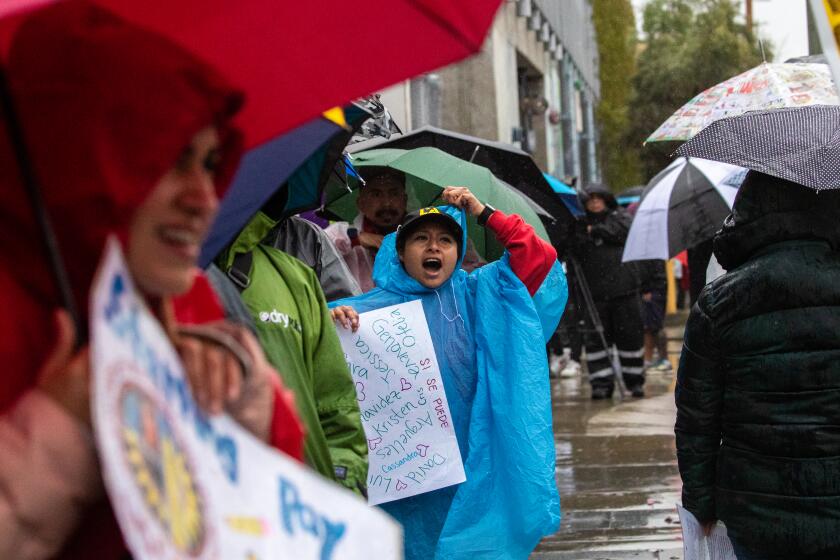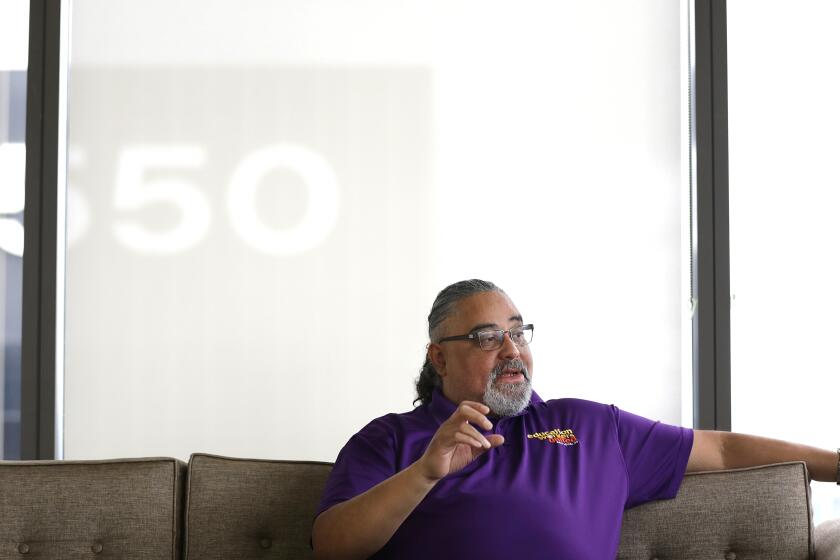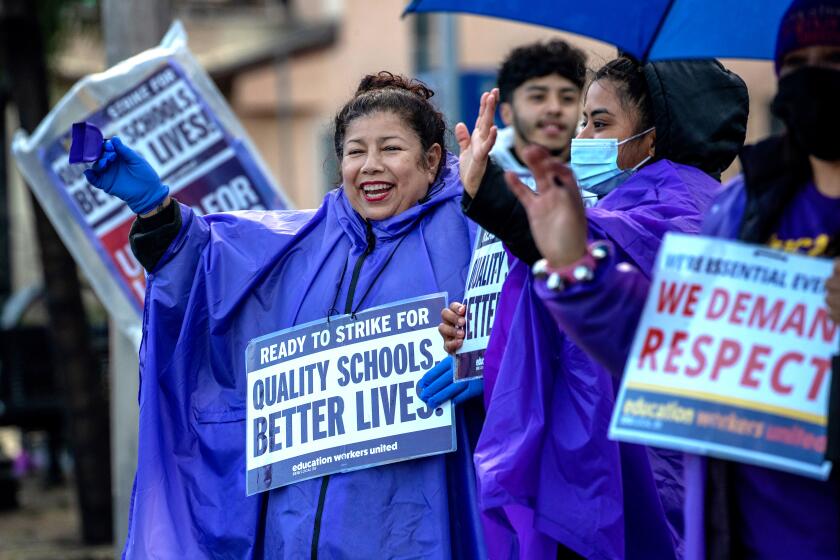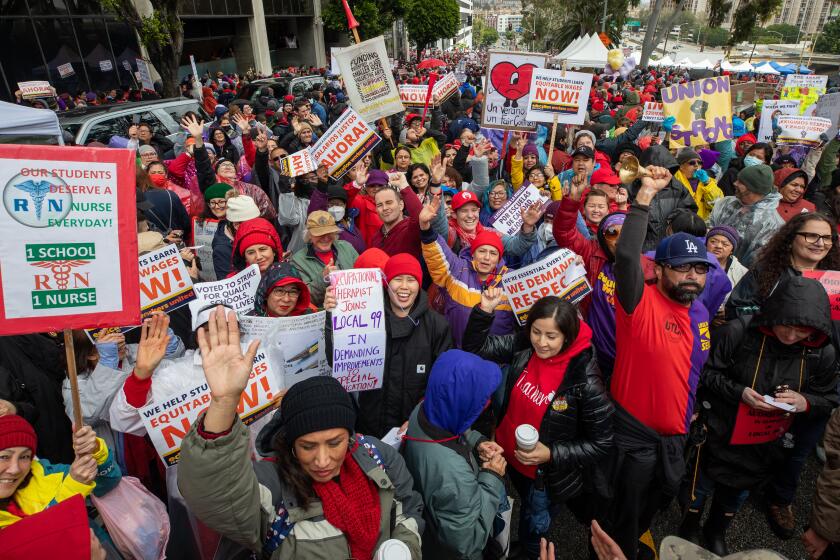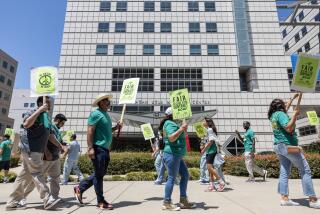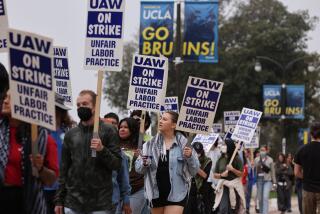Three-day LAUSD strike means three days without pay. How are low-paid workers coping?
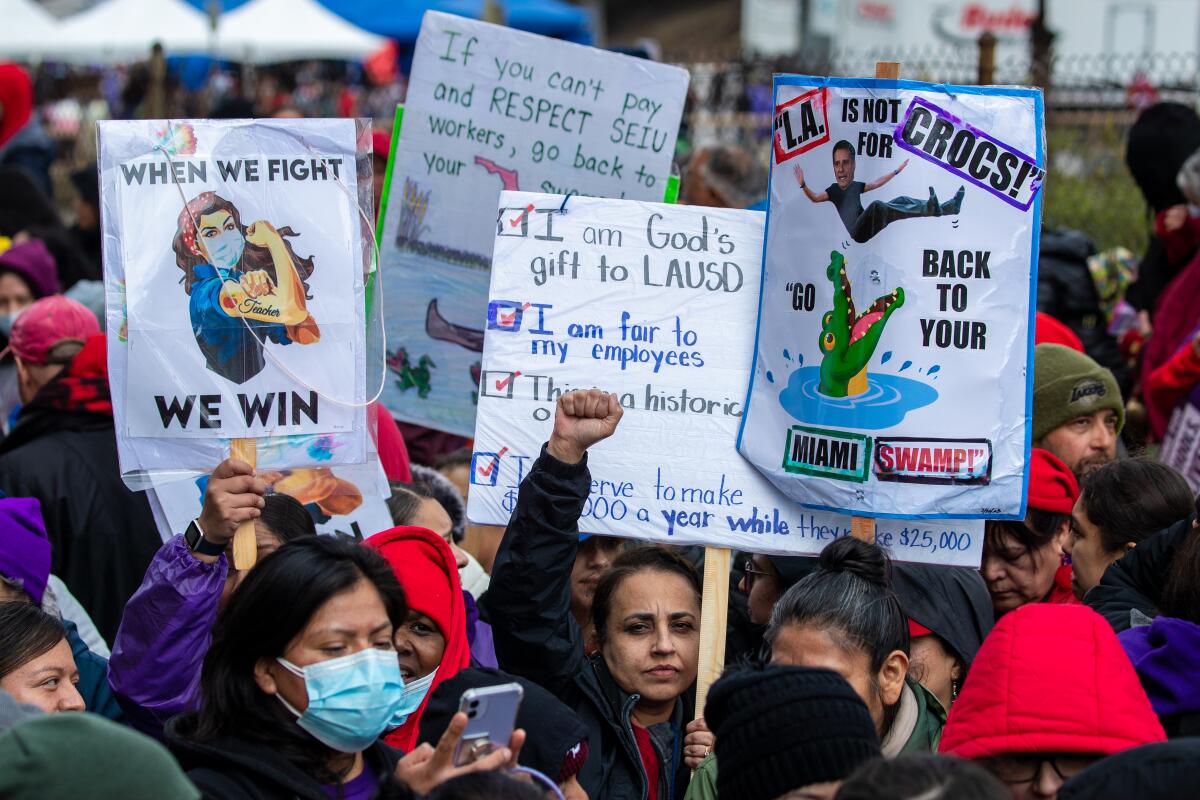
Carmen Marchany knows the three-day strike that has shuttered Los Angeles public schools is another blow to her already unstable finances. But the special education assistant still joined her colleagues on the picket line Wednesday morning outside South Gate High School, holding signs and chanting in the rain.
“Missing three days is a lot,” said Marchany, whose husband died from COVID-19. “But I know the feeling of being uncomfortable.
“But we need to feel uncomfortable now so we can feel relief and a better future later,” she said. “It’s what we must do.”
Thousands of Los Angeles Unified’s lowest-paid workers — education aides, like Marchany, as well as cafeteria workers, custodians, bus drivers and others — walked off the job Tuesday and are not paid for days missed. Local 99 of Service Employees International Union is leading the strike over unfair labor practice allegations against the district.
The union has been demanding a 30% salary increase, plus $2 more per hour for the lowest-paid employees. Such raises would increase the average annual wages of members from $25,000 to $36,000.
United Teachers Los Angeles joined the walkout in solidarity, forcing officials to close schools in the 420,000-student district.
LAUSD bus drivers, custodians, teachers, classroom aides and cafeteria workers join wet, cold picket lines at shuttered schools across the district.
Tears fell down Marchany’s cheek as she shared about the emotional and financial challenges of the strike.
“I heard a woman on the news last night say it was inconvenient for the strike to go on because she had trouble finding child care,” Marchany said. “Imagine struggling to provide — period.”
She said it’s been hard for her to support her family as the sole income earner, especially with low wages and rising inflation.
Marchany often picks up a “side hustle, but it shouldn’t have to be like that,” she said. “We love the kiddos but we love our kiddos too.”
Marchany believes it’s important to take a stand for a better future, and has appreciated support from the community. One of her student’s parents asked her how they could help the strikers.
“She said ‘I want the school to feel your absence,’” Marchany said. “And that meant the world to me.”
Max Arias fell into union organizing by accident, finding that his greatest satisfaction came not in raising his own voice but helping others find theirs.
There isn’t a strike fund that members can apply to for financial assistance, but the union is working to “provide limited assistance including prepared meals for striking workers and their families and food pantry and community resources,” according to the Local 99.
Some teachers union members have pulled together to support their colleagues, beyond joining them on the picket line, said Pacoima Middle School teacher Scott Mandel.
Mandel, who serves as the Los Angeles Valley East Area Chair for the teachers union, said that 20 teachers at Lorne Street Elementary School in Northridge raised about $800 for their Local 99 members.
“This is what we do,” Mandel said Wednesday at Sun Valley Polytechnic Senior High School. “We stand together.”
Day 2 of the massive L.A. Unified strike again shutters schools, as some of the district’s lowest-paid workers rally for higher wages.
While the strike may become a burden, especially financially for many, Mandel called it necessary.
“Losing three days of pay is an inconvenience for me,” Mandel said. “But losing three days of pay for the SEIU members is making rent that month and putting food on their table. So, how can I not be out here sharing the burden?”
At one point in his life, Eric Hernandez, who has worked as a school custodian for 17 years, said he was forced to chose between sleep or increased stability.
He worked two jobs: handling buildings, grounds and custodial duties at James Monroe High School in North Hills, while taking evening shifts at his neighborhood Target.
But the lack of sleep “burned him out,” forcing him to quit Target and return to his single salary — and the anxiety it induced.
Los Angeles Unified School District workers walk out in a strike expected to last through Thursday.
At a large rally Wednesday he carried a 3-foot sign that said, “When the poop hits the fan, I won’t be there 2 clean it!” as he marched around with crowds of union members at Lake Balboa.
“It’s unbelievable, but my pay hasn’t really raised much since I started,” the 43-year-old said. “Guys who start tomorrow are only making a little less than me.”
Hernandez said he’s had to change his diet recently to cope with surging food prices. Every other day he eats “25-cent ramen and an egg” to keep costs down. He’s taking a harsher approach during this three-day strike.
“I’m just cutting out meals and not eating,” he said. “One meal a day should be fine.”
Hernandez pleaded with district parents who have been frustrated having to rearrange their lives to accommodate the strike.
“We hope that they’ll just tough this out with us,” Hernandez said. “We have staffers and teachers here and we’re all just trying to get paid fairly.”
Pacoima resident Amelia Mendoza grabbed a much-appreciated ride from friends to Wednesday afternoon’s rain-soaked rally at Lake Balboa. The ride allowed Mendoza, a school climate advocate at Valley Oaks Center for Enriched Studies in Sun Valley, to save valuable gas money.
Workers who feed, transport, teach, heal and clean up after Los Angeles students kicked off a historic three-day strike Tuesday, shutting down the state’s largest school system as they rally for higher wages and better working conditions.
“What’s saved me is my tax refund,” she said. “It’s going to help me pay for rent and groceries and take care of my family. Without it, I’d be in trouble.”
At 26, Mendoza is the sole provider for a family of four, which includes her parents and a younger brother.
She said she’s also trying to complete her bachelor’s degree in psychology from Cal State Northridge, which prevents her from taking a second job.
“I’m just above the poverty line,” she said of her $34,000 a year salary.
Mendoza marched Wednesday because she said she loves assisting on campus: helping students talk through fights using conflict resolution or acclimate back into the classroom after a prolonged illness, such as COVID-19.
She says she offers “a place for students to feel safe.” Yet, she feels on edge financially.
“I don’t understand the priorities of this district,” she said. There are “thousands of janitors and bus drivers and lunch workers who need help to survive and it feels like we’re being ignored.”
On some days, Mendoza skips lunch to cut costs or eats “99-cent ramen,” while riding her bike to work, or taking the bus as gas prices soared.
“This is my life, just scraping to get by,” she said. “It’s really hard.”
Staff writer Howard Blume contributed to this report.
More to Read
Sign up for Essential California
The most important California stories and recommendations in your inbox every morning.
You may occasionally receive promotional content from the Los Angeles Times.
